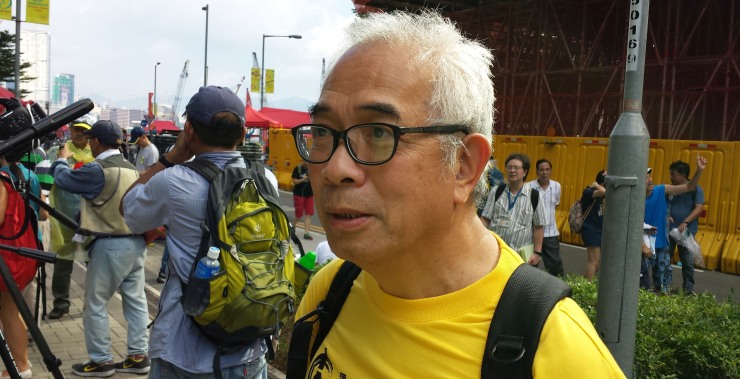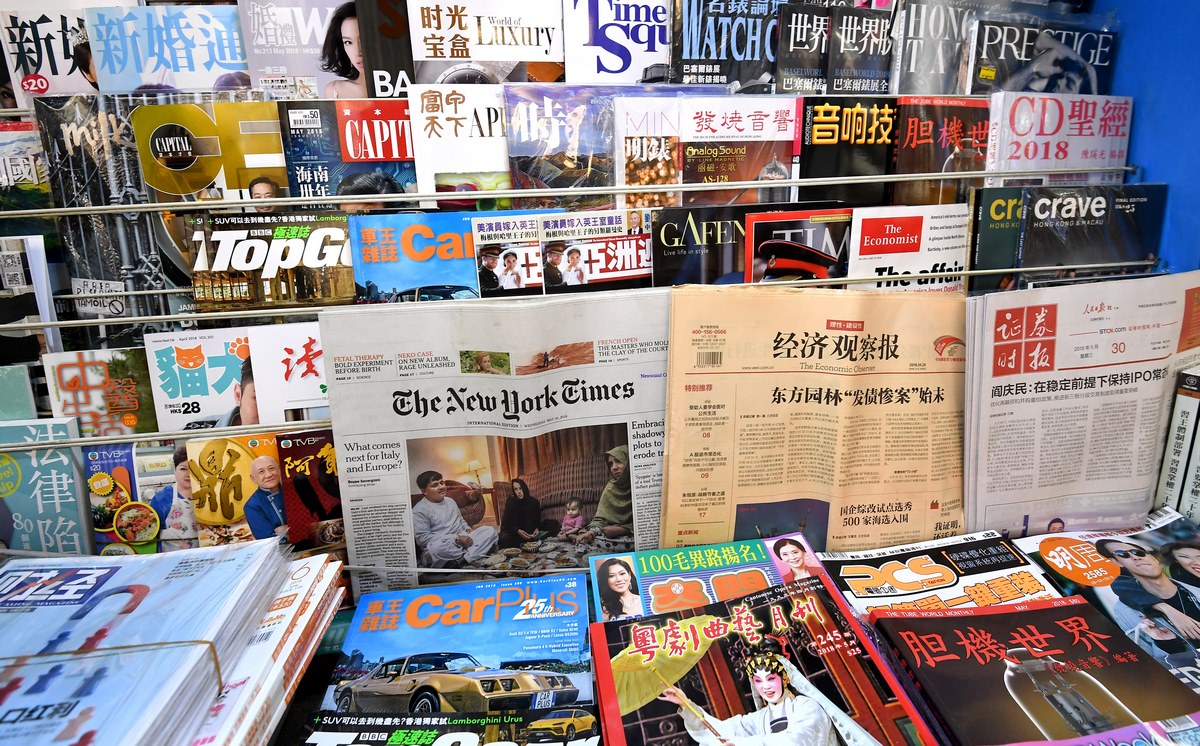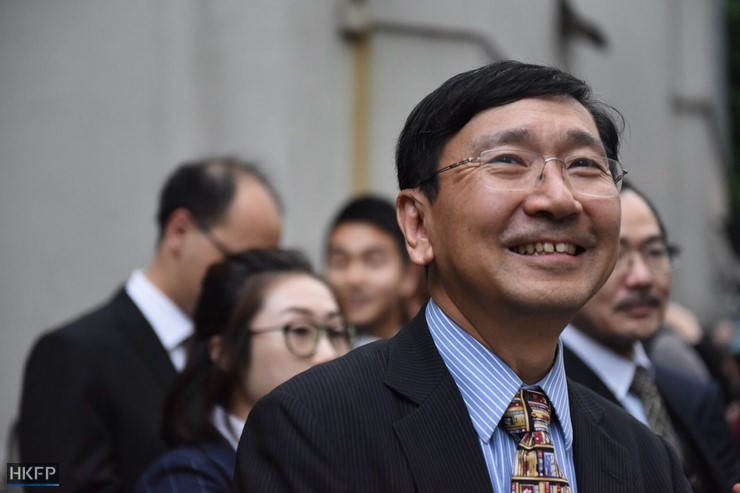Hans Yeung Wing-yu feared the worst when reporters from pro-Beijing newspapers, Ta Kung Pao and Wen Wei Po called him on 13 May last year. Earlier that day, Orange News, an online news site linked to Beijing’s top office in Hong Kong, had published an article in which the former history assessment development manager at the Hong Kong Examinations and Assessment Authority (HKEAA) was accused of distorting history.
The “evidence” was a 10-year-old “friends only” Facebook post in which Yeung had shared the story of a Henan man arrested for turning up to a wedding dressed as a soldier of the Japanese Imperial Army with the comment: “Without the Japanese invasion of China, would there be a New China?”

The government immediately ordered the HKEAA to conduct an investigation.
The following day, Yeung found himself on the front pages Wen Wei Po and Ta Kung Pao, labelled as a “yellow” (pro-democracy) examiner and slammed him as a “black hand” in the HKEAA. The stories were published under the banner of an “Education S.O.S.” series in Ta Kung Pao, and “Yellow Circle Brainwashing” series in Wen Wei Po. In an interview with digital outlet Citizen News, Yeung said he knew the timing was not a coincidence. On 14 May, students across Hong Kong sat their Chinese History DSE exam, and one of the questions had asked them to discuss whether Japan had done “more good than harm” to China between 1900 and 1945.
‘Han traitors’
Sure enough, the newspapers were splashed with news of the exam question, accusing it of glorifying the Japanese invasion and leading students to become “Han traitors.” The Education Bureau withdrew the question, invalidating thousands of answers, and after sustained pressure, Yeung resigned in August.

For veteran journalist and former Wen Wei Po deputy editor, Ching Cheong, the episode bore all the hallmarks of a planned and coordinated campaign. “The day the exam question came out, they had already doxxed [Yeung] – the Foreign Ministry, the Hong Kong and Macau Affairs Office and the China Liaison Office could react immediately,” says Ching.
“It’s possible intelligence services noticed some [of Yeung’s] comments some time ago, gathered all the data. Once they found out about the exam question, they could expose it on the same day. Wen Wei Po and Ta Kung Pao played a functional role in the process. When [Beijing] wants to publicise something, they use their tools, the Wen Wei Po and Ta Kung Pao.”

Historically, the so-called leftist (pro-Beijing) media in Hong Kong have served two main purposes: to disseminate propaganda and aid united front work. The latter refers to the Chinese Communist Party (CCP) practice of winning over and co-opting individuals, networks and groups both inside and outside of China to extend influence and control. In their heyday in the 1950s and early 1960s, there were five leftist dailies in Hong Kong, each targeting a specific readership.
Ching says Wen Wei Po was “the reddest of them all” and was aimed at readers within organisations directly led by the CCP, such as Beijing-backed unions, schools and enterprises. Ta Kung Pao was tasked with winning over business people and intellectuals. The now-defunct New Evening Post had a mission to expand a base of left-leaning readers, while the united front targets of Ching Po Daily (also defunct) and Commercial Daily were ordinary Hong Kong residents without strong partisan affiliations.
Lost market relevance
Unlike their counterparts in the mainland, CCP-backed media in colonial Hong Kong had to compete in the marketplace. Retired Baptist University journalism professor To Yiu-ming explains: “Hong Kong was useful to the CCP, had a role as a place where they could attract talent, resources, engage in diplomatic and economic activities, so the Hong Kong [leftist] papers had more flexibility… some of them – like the Ching Po Daily and Commercial Daily – offered entertainment and horse-racing… Jin Yong’s martial arts novels were first serialised in Ta Kung Pao.”
They were successful. Leftist newspapers enjoyed as much as 30 per cent of market share before the violence of the Cultural Revolution-inspired riots of 1967 – of which the then publisher of Ta Kung Pao was a leader – turned readers away in droves.

The publications lost market relevance but they continued to be read by those who needed to keep up with political developments as they often carried the first indications of policy decisions by the central government as they related to Hong Kong. This function has become more pronounced since Beijing strengthened its grip on Hong Kong in recent years, and especially after the implementation of the National Security Law.
Ching stresses that Ta Kung Pao and Wen Wei Po were and are “100 per cent party organ newspapers”, CCP mouthpieces under the direct control of propaganda officials in the CCP’s Hong Kong apparatus.

Control is also reflected in ownership. In 2015, a Next Magazine investigation uncovered business registration documents that showed a company controlled by the China Liaison Office, Guangdong Xin Wenhua owned 88.4 per cent of Wen Wei Po and 99.9 per cent of Ta Kung Pao. In turn, Guangdong Xin Wenhua controls a company that owns local publishing giant Sino United Publishing, which also controls the online platform Orange News along with Hong Kong’s biggest publishing and bookshop chains.
In 2016, Ta Kung Pao and Wen Wei Po were merged to pool editorial and technical resources although they continued to publish separate newspapers. In terms of editorial direction, little separates the titles.
Cultural Revolution-style
For the individuals and organisations that find themselves in the crosshairs of the publications, the consequences can be ominous. Ching says this is especially so for individuals who may be elevated to positions of power and influence. He cites the example of Johannes Chan Man-mun, the former Dean of Hong Kong University’s (HKU) Faculty of Law. Chan, a respected legal scholar known for having liberal political views, had been regarded a shoo-in for the position of pro-vice-chancellor for staffing and resources after being recommended by a search committee headed by the vice-chancellor in November 2014.

In January 2015, Wen Wei Po and Ta Kung Pao launched a series of articles attacking him. Among other things, they accused him of meddling in politics, of “harbouring” Occupy Central convenor Benny Tai Yiu-ting in his faculty and being responsible for a deterioration in the quality of research in the faculty under his leadership – a charge based on a then-embargoed University Grants Commission report. In a Ming Pao article, Chan described the campaign against him as a “Cultural Revolution style criticism-struggle”.
“They had categorised him as being in the ‘enemy’ camp,” says Ching. “Once they knew that Chan could become pro-vice-chancellor, Wen Wei and Ta Kung started to ramp it up. Then you can see that once they targeted him, many different people came out to criticise him. It created a very strong pressure of opinion that HKU was forced to take it into consideration.”
The HKU Council finally rejected Chan’s nomination in September 2015.

Aside from pro-democracy politicians, activists and activist groups, the education sector and academia, certain sections of the Hong Kong media are also often targeted for attack. The Hong Kong Journalists Association and RTHK are frequently criticised, but the most vitriol is levelled at Apple Daily and its founder Jimmy Lai.
These attacks have escalated in recent weeks, with Wen Wei Po and Ta Kung Pao publishing multiple pages decrying the proliferation of “fake news” in Hong Kong by pro-democracy “yellow media”, a trend it says was started by Apple Daily. The dailies have amplified calls for legislation to outlaw “fake news” and a Ta Kung Pao opinion piece written by a senior commentator called for Apple Daily to be banned.
Party mouthpiece
Ching says it doesn’t bode well for Hong Kong’s sole openly pro-democracy newspaper. “When I was at Wen Wei Po, many of these op-ed submissions were actually written by personnel in the New China News Agency (NCNA) policy departments. They reflected the position of the NCNA and were intended to direct opinion and reflect intentions on the part of the leadership.” The NCNA was Beijing’s de facto representative in colonial Hong Kong that was replaced by the China Liaison Office in 2000.

Today, Ching sees Beijing using its Hong Kong proxies to “release test balloons” to gauge public opinion and hint at policies. And officials and politicians are taking notice. “Does that mean people have to adjust their stances based on their editorials? I don’t know. Maybe we haven’t reached that stage yet,” he says. “But what we can say for sure is that their editorials carry much more weight after the NSL [National Security Law] than before.”
With the national security apparatus firmly in place and the lines constantly being redrawn on what is permissible in Hong Kong, it is not just senior government officials who are paying attention to Ta Kung Pao and Wen Wei Po.
“In the past, people wouldn’t give them a second thought. They have very few readers and what they say is totally out of step with Hong Kong values,” says Ching. “But now the CCP’s influence is everywhere and inescapable. It has comprehensive governance and when it has comprehensive governance, you have to listen to what its mouthpiece in Hong Kong is saying.”
Support HKFP | Policies & Ethics | Error/typo? | Contact Us | Newsletter | Transparency & Annual Report | Apps
Help safeguard press freedom & keep HKFP free for all readers by supporting our team

LATEST FROM HKFP
HKFP has an impartial stance, transparent funding, and balanced coverage guided by an Ethics Code and Corrections Policy.
Support press freedom & help us surpass 1,000 monthly Patrons: 100% independent, governed by an ethics code & not-for-profit.










